英语句中结构的省略
英语中的省略

英语中的省略为了避免重复,英语句子中某些部分可以省略。
常见的省略有以下几种:一、状语从句中的省略在时间、条件、让步及比较状语从句中,如主句和从句主语一致(或从句主语是it),且从句含be动词时,可将从句中的主语和be动词省略,从而构成“连词+ 分词/形容词/副词/介词”结构。
这里常见的连词有when/while/as/if/unless/once/although/though/than等。
When (water is )heated, water is turned into vapor. 水加热时变成气体。
He works very hard though(he is)rather weak. 他尽管体弱,但他十分努力地工作。
He came earlier than(he had been)expected. 他来得比预料的要早。
考例:①The research is so designed that once ____ nothing can be done to change it.A. beginsB. having begunC. beginningD. begun②If you go to Xi' an, you will find the palaces there more magnificent than commonly ___ .A. supposingB. supposedC. to supposeD. suppose分析:①D。
once后省略了the research is begun ②B。
比较状语从句中的完整形式是:than they are commonly supposed。
二、并列结构的省略1.并列结构一般由and, or, but等连接,他们可以连接单词、短语或分句,其中相同成分出现时可以被省略。
One of the sides of the board should be painted yellow, and ____.A.the other is whiteB. another whiteC. the other whiteD. another is white选C。
英语中几种常用省略的用法总结

英语中几种常用省略的用法总结省略在英语语言的应用非常广泛,其中有很多常用的省略用法。
下面总结一下以往常见的一些省略形式:一、表示未表达完整的缩写1、单字缩写。
如: is,>’s; has,>’s; have,>’ve;I,>I’m; he,>he’s; she,>she’s; do,>do’s;does,>does’s; am,>am’s2、多字缩写。
如:are not,>aren’t; cannot,>can’t; do not,>don’t; will not,>won’t; have not,>haven’t; would not,>wouldn’t; could not,>couldn’t; shouldnot,>shouldn’t; it is,>it’s; that is,>that’s; there is,>there’s二、表示不完整词组的省略1、定语从句中的省略。
如:(1) All the students (who are) present here are eager to study.(2) This is the reason (why) he decided to quit his job.2、表示概念的省略。
如:(1) TV and radio (programmes).(2) To do more exercise (is beneficial to your health).三、表示句子成分的省略1、宾语的省略。
如:(1) I like to read (books).(2) He gave me an answer (to my question).2、表语的省略。
如:(1) He is a teacher (of English).(2) The weather today is (very) hot.3、主语的省略。
英语语法中的省略有哪些

英语语法中的省略有哪些英语是按照分布面积而言最流行的语言,但母语者数量是世界第三,仅次于汉语、西班牙语。
它是学习最广泛的第二语言,是近60个主权国家的官方语言或官方语言之一。
下面是店铺为大家收集的英语语法中的省略有哪些,欢迎阅读,希望大家能够喜欢。
英语语法中的省略有哪些一、并列复合句中某些相同成分的省略。
二、在when,while,if,asif,though(或although),as,until,once,whether,unless,where等连词连接的状语从句中,常省略跟主句相同的主语和be动词。
三、当见到“when(或if,where,wherever,whenever,assoonas,asfastas,than等)+possible/necessary等”时,可理解中间省略了itis(或was)。
四、有形式主语it的主语从句可省略that。
五、在限制性定语从句中可省略作宾语的关系代词whom,which,that。
六、在direction(方向),way(方式),distance(距离),time(时间),times(倍数)等后面所接的定语从句中常省略that,which,inwhich。
七、以therebe开头的句子,其主语的定语从句常可省略关联词,而therebe结构作定语从句时,省略作主语的关系代词。
八、命令句、惊叹句、部分第一人称的陈述句、部分问句和答句中省略最为常见。
九、用so,not或其它手段来省略上文或问句中的'一部分或整个句义。
小升初英语语法省略句知识点1. 省略句的定义省略是为了避免重复、突出新信息并使上下文紧密连接的一种语法修辞手段。
省略在语言中,尤其在对话中,是一种十分普遍的现象。
2.小品词的省略1)省略介词I ‘ ve studied English (for) five years. 我已学五年英语了。
2)省略连词thatI believe (that) you will succeed . 我相信你们会成功的。
英语中常见的省略
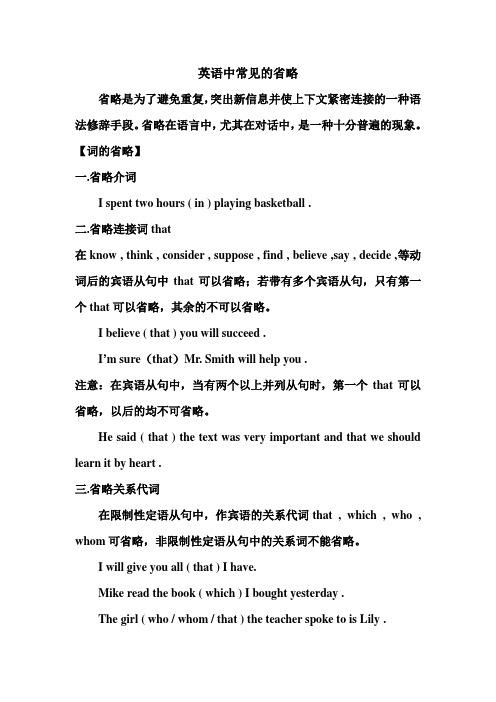
英语中常见的省略省略是为了避免重复,突出新信息并使上下文紧密连接的一种语法修辞手段。
省略在语言中,尤其在对话中,是一种十分普遍的现象。
【词的省略】一.省略介词I spent two hours ( in ) playing basketball .二.省略连接词that在know , think , consider , suppose , find , believe ,say , decide ,等动词后的宾语从句中that可以省略;若带有多个宾语从句,只有第一个that可以省略,其余的不可以省略。
I believe ( that ) you will succeed .I’m sure(that)Mr. Smith will help you .注意:在宾语从句中,当有两个以上并列从句时,第一个that可以省略,以后的均不可省略。
He said ( that ) the text was very important and that we should learn it by heart .三.省略关系代词在限制性定语从句中,作宾语的关系代词that , which , who , whom可省略,非限制性定语从句中的关系词不能省略。
I will give you all ( that ) I have.Mike read the book ( which ) I bought yesterday .The girl ( who / whom / that ) the teacher spoke to is Lily .【句子成分的省略】一.省略主语。
如:Beg your pardon. ( Beg前省略了主语I )Take care ! ( Take前省略了主语you )Looks as if it is going to rain . ( Looks前省略了主语it )二.省略谓语。
英语中常见的省略

英语中常见的省略省略是为了避免重复,突出新信息并使上下文紧密连接的一种语法修辞手段。
省略在语言中,尤其在对话中,是一种十分普遍的现象。
【词的省略】一.省略介词I spent two hours ( in ) playing basketball .二.省略连接词that在know , think , consider , suppose , find , believe ,say , decide ,等动词后的宾语从句中that可以省略;若带有多个宾语从句,只有第一个that可以省略,其余的不可以省略。
I believe ( that ) you will succeed .I’m sure(that)Mr. Smith will help you .注意:在宾语从句中,当有两个以上并列从句时,第一个that可以省略,以后的均不可省略。
He said ( that ) the text was very important and that we should learn it by heart .三.省略关系代词在限制性定语从句中,作宾语的关系代词that , which , who , whom可省略,非限制性定语从句中的关系词不能省略。
I will give you all ( that ) I have.Mike read the book ( which ) I bought yesterday .The girl ( who / whom / that ) the teacher spoke to is Lily .【句子成分的省略】一.省略主语。
如:Beg your pardon. ( Beg前省略了主语I )Take care ! ( Take前省略了主语you )Looks as if it is going to rain . ( Looks前省略了主语it )二.省略谓语。
中考英语省略句的归纳总结
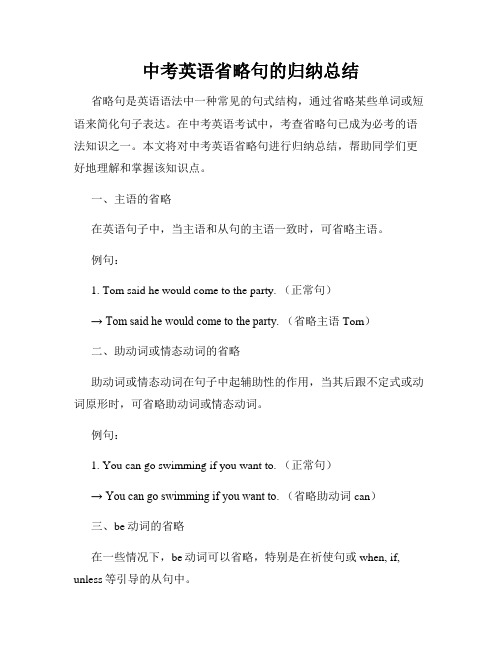
中考英语省略句的归纳总结省略句是英语语法中一种常见的句式结构,通过省略某些单词或短语来简化句子表达。
在中考英语考试中,考查省略句已成为必考的语法知识之一。
本文将对中考英语省略句进行归纳总结,帮助同学们更好地理解和掌握该知识点。
一、主语的省略在英语句子中,当主语和从句的主语一致时,可省略主语。
例句:1. Tom said he would come to the party. (正常句)→ Tom said he would come to the party. (省略主语Tom)二、助动词或情态动词的省略助动词或情态动词在句子中起辅助性的作用,当其后跟不定式或动词原形时,可省略助动词或情态动词。
例句:1. You can go swimming if you want to. (正常句)→ You can go swimming if you want to. (省略助动词can)三、be动词的省略在一些情况下,be动词可以省略,特别是在祈使句或when, if, unless等引导的从句中。
例句:1. Be quiet and listen to the teacher. (正常句)→ Be quiet and listen to the teacher. (省略be动词)四、状语的省略当主句和从句之间的时间状语、地点状语、方式状语等相同或相似时,可将其在从句中省略。
例句:1. He lives in Beijing and I live in Beijing. (正常句)→ He lives in Beijing and I do too. (省略相同的地点状语in Beijing)五、连接词的省略在句子中,连接词如and, but, or等可以省略,特别是在并列句中。
例句:1. She is tall and she is thin. (正常句)→ She is tall and thin. (省略连接词and)六、祈使句中的省略在祈使句(祈使句用于表达命令、请求、劝告等)中,主语you可以省略。
英语中省略现象

英语中省略现象高中英语语法之省略英语中省略现象较为普遍,对省略的考查已成为高考中的热点。
句子成分的省略,可分为以下几种情况:为了使话说得简明扼要,英语句子中某个单词、短语甚至从句或主句都可以省去。
Ⅰ、状语从句中的省略用法一、如果从句的主语和主句的主语一致,且从句的谓语含有be动词的某种形式(am/is/are/was/were),可同时省略从句的主语和be动词的某种形式。
1、when,while引导的时间状语从句e.g. Do be careful when (you are) crossing the street.When/While (I was) on my way to work, I met her.2、if,unless,once引导的条件状语从句e.g. If (it is) properly treated, waste will do no harm to the environment.I’ll not go to the party unless (I am) invited.Once (you are) caught stealing in a supermarket, you will be punished.3、though,although,whether,no matter whether/what/how/who等引导的让步状语从句e.g. He was happy, though/although (he was) poor.Whether (she is) sick or well, she is always cheerful.No matter how/However hard the task (is), we must fulfill it in time.(注:从句的主语和主句的主语不一致时,只省略从句中的be动词形式)4、as if,as though引导的方式状语从句e.g. He rubbed his eyes and yawned as if/though (he was) waking up after along sleep.He stood up as if/though (he wanted) to leave.(as if/though + to do表示一个将来的动作)二、than,as引导的比较状语从句中的省略用法:当不同的主语进行比较时,一般省略从句中的谓语;当从句中的主语与谓语(be动词除外)和主句中的主语与谓语相同时,通常省略从句中的主语和谓语,只保留比较部分。
英语语法---省略
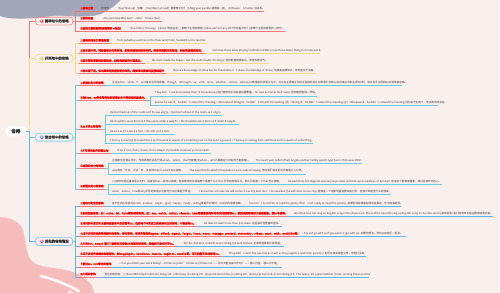
省略1简单句中的省略2并列句中的省略3复合句中的省略4其他的省略情况1.省略主语2.省略宾语3.省略主语和谓语(或谓语的一部分)1.动词不定式的省略2.某些使役动词,如:m a k e,le t,h a v e等和感官动词,如:see,w a t c h,no ti ce,o b ser v e,h ear等后⾯作宾补的不定式须省略t o,但若这些动词⽤于被动语态,则t o不省略。
3.并列的不定式可以省略后⾯的不定式符号t o。
但若两个不定式之间表⽰对⽐关系时,不能省略t o。
4.当不定式在某些动词后作宾语时,常可省略。
常⻅的动词有agree,a ff or d,e xp ec t,f orge t,h o p e,k no w,m anage,p re t en d,re m e mb er,re f use,w an t,wi s h,w oul d l ik e等。
5.介词b u t,e x ce pt (除了) 前有实义动词d o的某种形式时,后⾯的不定式不带t o。
6.当不定式作某些复合谓语时,如b e go i ng t o,b e a b le t o,h a v e t o,oug ht t o,use d t o等,可只保留不定式符号t o。
7.使⽤so,no t等时的省略8.介词的省略(Y ou co m e) Thi s w a y,p lease. 请这边⾛。
(省略了主语和谓语) (Ha v e y ou) G o t an y i n k? 你有墨⽔吗?(省略了主语和谓语的一部分)常⻅的结构有: (1)h a v e diffi cul ty/t rou b le (i n) d o i ng s th. (2)b e b us y (i n) d o i ng s th. (3)s p en d so m e tim e (i n) d o i ng s th. (4)s t o p/p re v en t s b. (f ro m) d o i ng s th. Th e h ea vy ra i n p re v en t e d him (f ro m) arr ivi ng th ere on tim e.—Can y ou fi n i s h y our w or k t o d a y? —I thi n k so./I d on’t thi n k so./I thi n k no t. ——你今天能完成⼯作吗? ——我认为能。
完整版英语省略句的六大总结

完整版英语省略句的六大总结
1.主语省略:当主语已经被上下文所明确时,可以省略主语。
例句:(原句)I am going to the bookstore.
(省略) Going to the bookstore.
2.谓语动词省略:当谓语动词已经被上下文所明确时,可以省略谓语动词。
例句:(原句)She can play tennis very well.
(省略) She can play very well.
3.宾语省略:当上下文中已明确了宾语时,可以省略宾语。
例句:(原句) Would you like to have some watermelon?
(省略) Would you like some?
4.介词省略:当介词与其宾语紧密相连,且已明确时,可以省略介词。
例句:(原句) We are waiting for you in the park.
(省略) We are waiting for you the park.
5.主语从句省略:当主语从句中的主语与句子的主语相同,可
以省略主语从句。
例句:(原句) That he could swim surprised me.
(省略) To swim surprised me.
6.定语从句省略:当定语从句中的关系代词为主语时,可以省略关系代词。
例句:(原句) The book that I borrowed from the library is very interesting.
(省略) The book I borrowed from the library is very interesting.。
英语中的各种“省略”

英语中的各种“省略”一、简单句中的省略1. 省略主语1)祈使句中的主语通常被省略。
如:(You) Open the door,please.请开一下门。
2) 其它省略主语多限于现成的说法。
如:a) (I) Thank you for your help 谢谢你的帮助。
b) (It )Doesn’tmatter.没关系。
2. 省略主谓语或主谓语的一部分a) (There is) No smoking.禁止抽烟b) (Is there)anything else ? 还有其他事吗?c) (You come)This way please.请这边走。
d) (Will you) Have a smoke ? 抽烟吗?3. 省略宾语—Do you know Mr. Li ? 你认识李先生吗?—I don’t know (him.) 我不认识他4. 省略表语—Are you thirsty ? 你30岁了吗?Yes , I am (thirsty).是的,我是。
5. 同时省略几个成分—Are you feeling better now? 你觉得好些了吗?—(I am feeling ) Much better(now) 好多了。
(I wish) Good luck (to you) .祝你好运/祝你顺利。
二. 并列复合句中的省略在并列句中后边的分句可以省略与前边分句中相同的成分。
如:a) The boy picked up a coin in the road and (the boy ) handed it to a policeman.这个男孩在马路上拾起一枚硬币并把他交给了警察。
b) Your advice made me happy but(your advice made) Tom angry .你的建议使我高兴但使汤姆生气。
c) Tom must have been playing basketball and Mary (must have been)doing her homework.汤姆肯定一直在打篮球,玛丽一直在写作业。
答英语中的省略有两种一是替代省略,即用其他词代替句

答:英语中的省略有两种:一是替代省略,即用其他词代替句子中重复或相同的部分;二是结构省略,即根据语境需要,承前或后省略句子中相同的某些句子成分。
这类题型在历届高考试题中屡见不鲜。
一、替代省略1.用it, one, that替代句子中重复出现的名词、代词或句子。
one是指代同名称的另一样东西(同类异物),代替前面句子中重复出现的可数名词;that 替代特指可数或不可数名词,后面常跟有in或of短语作后置定语;it指代同名称的同样事物(同类同物)。
[考例]1) Meeting my uncle after all these years was an unforgettable moment, ______ I always treasure.A. thatB. oneC. itD. what析:正确答案是B.one代替泛指的an unforgettable moment, 在句中作同位语,起补充说明的作用。
I will always treasure是定语从句修饰one.2) -Why don't you take a break?-Didn't we just have _____?A. itB. thatC. oneD. this析:由题干分析,代词指代的是前面的a break,为单数泛指概念,故答案为C.one代替泛指的单数名词,相当于“a / an+单数名词”。
若替代前面提到的泛指复数名词要用ones,替代特指复数名词则用those或the ones.3) Equipped with modern facilities, today's libraries differ greatly from ________.A. those of the pastB. the pastC. which of the pastD. these past析:答案是A.those代替the libraries.2.在两个分句中,当两者(人或物)情况或意思完全相同,第二个分句用so, neither, nor, either等引出时,出现省略现象,其中neither, nor, so还可引起倒装结构,表示“也不……”、“也……”。
语法“省略”
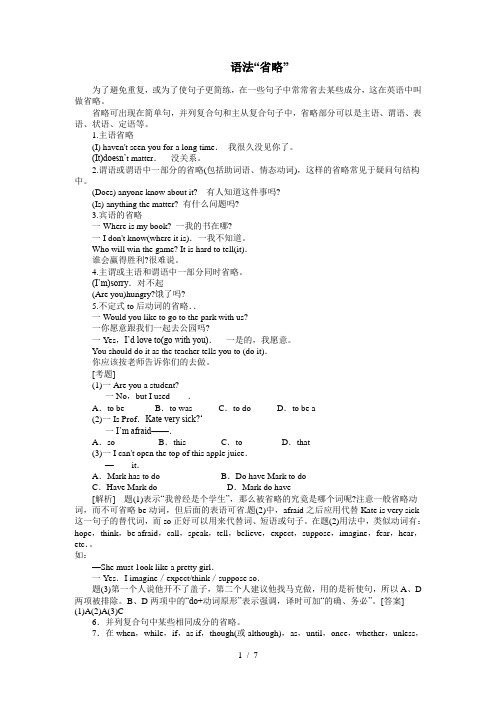
语法“省略”为了避免重复,或为了使句子更简练,在一些句子中常常省去某些成分,这在英语中叫做省略。
省略可出现在简单句,并列复合句和主从复合句子中,省略部分可以是主语、谓语、表语、状语、定语等。
1.主语省略(I) haven't seen you for a long time.我很久没见你了。
(It)doesn’t matter.没关系。
2.谓语或谓语中一部分的省略(包括助词语、情态动词),这样的省略常见于疑问句结构中。
(Does) anyone know about it? 有人知道这件事吗?(Is) anything the matter? 有什么问题吗?3.宾语的省略一Where is my book? 一我的书在哪?一I don't know(where it is).一我不知道。
Who will win the game? It is hard to tell(it).谁会赢得胜利?很难说。
4.主谓或主语和谓语中一部分同时省略。
(I’m)sorry.对不起(Are you)hungry?饿了吗?5.不定式to后动词的省略..一Would you like to go to the park with us?一你愿意跟我们一起去公园吗?一Yes,I’d love to(go with you).一是的,我愿意。
You should do it as the teacher tells you to (do it).你应该按老师告诉你们的去做。
[考题](1)一Are you a student?一No,but I used____.A.to be B.to was C.to do D.to be a(2)一Is Prof.Kate very sick?‘一I’m afraid——.A.so B.this C.to D.that(3)一I can't open the top of this apple juice.—____it.A.Mark has to do B.Do have Mark to doC.Have Mark do D.Mark do have[解析] 题(1)表示“我曾经是个学生”,那么被省略的究竟是哪个词呢?注意一般省略动词,而不可省略be动词,但后面的表语可省.题(2)中,afraid之后应用代替Kate is very sick 这一句子的替代词,而so正好可以用来代替词、短语或句子。
英语并列句、复合句(复杂句)中的省略规则
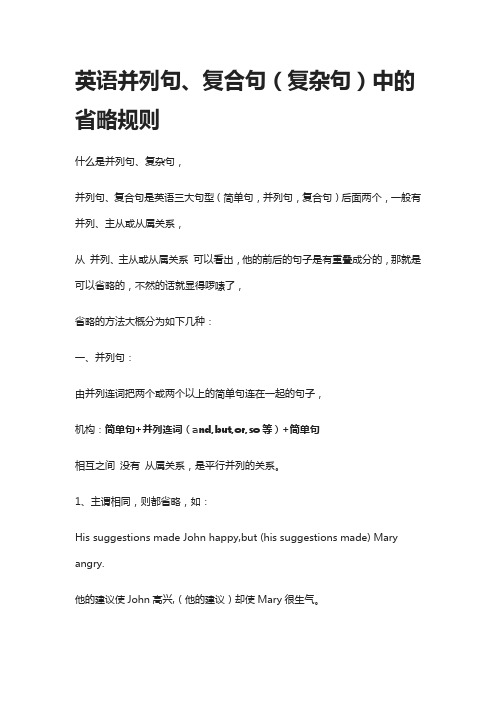
英语并列句、复合句(复杂句)中的省略规则什么是并列句、复杂句,并列句、复合句是英语三大句型(简单句,并列句,复合句)后面两个,一般有并列、主从或从属关系,从并列、主从或从属关系可以看出,他的前后的句子是有重叠成分的,那就是可以省略的,不然的话就显得啰嗦了,省略的方法大概分为如下几种:一、并列句:由并列连词把两个或两个以上的简单句连在一起的句子,机构:简单句+并列连词(and,but,or,so等)+简单句相互之间没有从属关系,是平行并列的关系。
1、主谓相同,则都省略,如:His suggestions made John happy,but (his suggestions made) Mary angry.他的建议使John高兴,(他的建议)却使Mary很生气。
2、主语相同,则省主语,如:Old Tom gave up smoking for a while, but (he) soon returned to his old ways.Old Tom戒了一阵子烟,可(他)很快又抽上了。
3、谓语时态相同,则省略谓语时态中相同的部分,如:John must have been playing football and Mary (must have been) doing her homework.John一定一直在踢球,而Mary一定一直在做作业。
注:在并列中,还有复合句,如果that从句从属于第二个并列句,并且它的谓语、宾语等其他成分和第一并列句相同时,that从句中可以省略这些相同的部分,如:Tom will sing at the party,but I know John won't (sing at the party). Tom将在晚会上唱歌,但我知道John不会(在晚会上唱歌)。
二、复合句:有主从或从属关系,可从三大从句说起,名词从句、定语从句、状语从句。
1、名词从句,名词从句在句中相当于名词,可以插入名词的地方就可以插入它,1)作宾语时,主谓都可以省略,如:He has gone, but no one knows where (he has gone).他出发了,但没人知道他去哪里了。
省略句的常见形式与解析
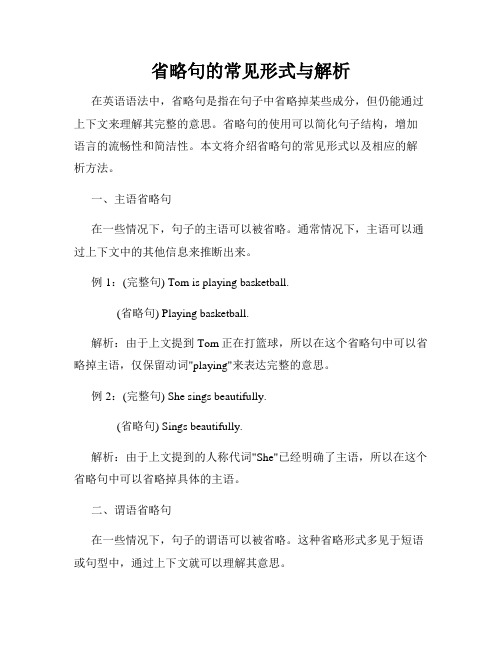
省略句的常见形式与解析在英语语法中,省略句是指在句子中省略掉某些成分,但仍能通过上下文来理解其完整的意思。
省略句的使用可以简化句子结构,增加语言的流畅性和简洁性。
本文将介绍省略句的常见形式以及相应的解析方法。
一、主语省略句在一些情况下,句子的主语可以被省略。
通常情况下,主语可以通过上下文中的其他信息来推断出来。
例1:(完整句) Tom is playing basketball.(省略句) Playing basketball.解析:由于上文提到Tom正在打篮球,所以在这个省略句中可以省略掉主语,仅保留动词"playing"来表达完整的意思。
例2:(完整句) She sings beautifully.(省略句) Sings beautifully.解析:由于上文提到的人称代词"She"已经明确了主语,所以在这个省略句中可以省略掉具体的主语。
二、谓语省略句在一些情况下,句子的谓语可以被省略。
这种省略形式多见于短语或句型中,通过上下文就可以理解其意思。
例1:(完整句) He can play the guitar, but I can't.(省略句) He can play the guitar, but I can't play (the guitar).解析:在这个省略句中,通过上文提到的主题"play the guitar",可以省略掉谓语"Not",而保留上文中的句意。
例2:(完整句) John lives in New York, and Mary in Los Angeles.(省略句) John lives in New York, and Mary in Los Angeles.解析:在这个省略句中,由于谓语"lives"已经在上文中出现过,因此可以省略掉后面的谓语,仅根据上下文理解出Mary的具体情况。
英语句中结构的省略

e) 虚拟语气条件句中if的省略
与If引导的条件从句中含有were, had时,可将if省略,并用倒装结构。
Were I you, I wouldn't go with him.
二、结论
“省略”不仅是一种以无为有的表达方法,更是一种简便至极, 虽无胜有的修辞手段。 大文豪莎士比亚有句名言:Brevity is the soul of wit. 意为:“言以简洁为贵”。 尤其对学习语言并以此为乐的英语学员们来说甚有同感!“简洁”二字并非简洁,而真要做到“简”得恰到好处、“洁”得恰如其分,省略法的研究与掌握是势在必行且乐在其中的事。
I guess Lisa will dance in the party but Jane won't (dance in the party).
②在两个并列的that从句如主语相同,而谓语不同,可把第二个that从句的连词和主语一起省略。
Tell Peter that I'll call to see him and (that I 'll ) have talk with him.
— Would you like to come to dinner tonight?
— I'd like to. But I'm too busy. ( 此句中的I'd like to 后省略了come to dinner tonight.)
e) 介词(或介词短语)的省略
①动名词前面的介词in在一定条件下常被省略
The examination (being) over, we all left the school.
d) 不定式的省略
①并列的不定式
英语中值得注意的五类省略结构

英语中值得注意的五类省略结构一、由if构成的省略这类省略结构最重要的有 if so, if not, if you must三个。
如:Is the book available, and if so where? 有没有这本书?如果有的话,在哪里?Are you a student with a knack for coming up with great ideas? If so, we would love to hear from you. 你是那种能想出好主意的学生吗?如果是,我们倒想听一听。
I hope to see you tomorrow, but if not, leave me a message. 我希望明天跟你见面,不过如果不行的话,请给我留个口信。
I think I can fix it tomorrow. If not, you’ll have to wait till Friday. 我想我明天就可以修好它,如果不行,你就只好等到星期五了。
The snow was now two feet deep, making it difficult, if not impossible, to get the car out. 雪有两英尺厚,要把汽车拉出来很困难,尽管不是不可能。
“I’m just going to finish this off first.” “Go ahead then, if you must.” “我只是打算先把这件事做完。
”“如果你非得要做的话,那就继续吧。
”二、由从属连词后接形容词构成的省略结构这类省略比较重要的是由从属连词if, when, where, whenever, wherever等,后接形容词necessary, possible等构成。
如:Taste the soup and add salt and pepper if necessary. 尝尝这汤,需要的话加一点点盐和胡椒粉。
英语中的省略句和省略句的规则

英语中的省略句是一种特殊的句型,通过省略部分句子成分,使句子更加简洁、流畅。
省略句的使用可以提高句子表达的效果,但也需要注意一些规则。
在英语中,常见的省略句有主语、谓语、宾语和其他成分的省略。
以下是一些常见的省略句规则:1.主语的省略当主语已经在上下文中明确指出时,可以省略主语。
例如:•Who is the winner? (Who: 主语)•Tom is. (Tom: 主语)2.谓语的省略当句子中的谓语动词与上文中的主谓一致时,可以省略谓语动词。
例如:•Have you finished your homework? (Have you: 谓语动词)•Yes, I have. (I have: 谓语动词)3.宾语的省略当宾语是不定式短语、动名词短语或从句时,有时可以省略宾语。
例如:•I want to eat some ice cream. (to eat some ice cream: 宾语)•I want to. (to: 宾语)•She enjoys swimming in the summer. (swimming in the summer: 宾语)•She enjoys it. (it: 宾语)4.其他成分的省略有些介词短语或副词短语在语境中已经明确,可以省略。
例如:•Peter is going to the supermarket. (to the supermarket: 介词短语)•So is Mary. (So: 其他成分)•He said he would visit us tomorrow. (tomorrow: 副词短语)•He said he would. (He: 其他成分)正如以上所述,省略句是一种简化语句结构的技巧,使句子更加简洁。
然而,省略句也有一些注意事项。
首先,省略句要根据上下文进行判断。
如果没有足够的上下文信息,可能会造成误解。
其次,省略句需要遵守语法规则。
(完整版)英语省略句的六大总结

英语中的六大省略现象概念:为了避免重复,省略句中的一个或几个句子成分,这种语法现象称为省略1. 简单句中的省略现象(6)名词所有格修饰的名词若表示店铺、 住宅、 教堂或上下文已暗示或明确指出过 的事物。
例如:例:( 1)在对话中,例如:— How is your mother today?— (She is) Much better.(2) 在祈使句中,例如: (You) Open the door, please!(3) 在感叹句中,例如: What a (good) boy (he is)! How (hard) they are working!( 4)表示讲话人的意见和看法, (It) sounds fine to me.(It's a) pity you couldn't come.(5)提问,例如: (Is there) anything wrong? (Have you)found the treasure? 你妈妈今天怎样? 她)好多了。
请开门!多好的男孩啊!他们工作得多努力呀!上下文意思很清楚,例如:你不能来,真遗憾。
发生了什么事吗?你已经找到珠宝了吗? at her mother's (house)在她妈妈家里 at the doctor's (house)在医院里 at the barber's (shop)在理发店里 at the tailor's (shop) 在裁缝店里(7)动词不定式的省略。
式符号 前面出现过的动词在下文再次出现时, to 。
动词不定式的省略,一般只省略动词,而保留符号“ 可以单纯使用不定 to ”。
例如:—Will you go with me? 你愿意跟我一块去吗?—Well, I'd like to(go with you). 我非常愿意。
I'd like to. 也可用I'd love to. /I'd be happy to. 来取代。
英语省略句

高考英语考点-省略句省略句是高考考查的语法重点,又是学习的难点。
在英语中,为了使句子简洁明快,突出重点,常用"省略句",只要不影响句意的表达,能省略的成分尽可能省略。
省略现象随处可见,大致可分为以下几种情况。
一、句子成分的省略1. 省略主语。
如:Haven't seen you for ages!好久不见了!2.省略谓语。
如:(Is there) Anything you want? 你要什么东西吗?(Does) Anybody need help? 有人要帮忙吗?3. 省略宾语。
如:I don't know (where he is ). 我不知道。
4.省略主语和谓语(或谓语的一部分),只剩下表语、宾语、状语或其它成分。
如:(I'm) Afraid I can't come. 恐怕我不能来了。
(Have you) Got any ink? 你有墨水吗?【高考链接】-It’s a long time since I saw my sister.(2007全国卷1)-_________her this weekend?A. W hy not visitB. Why not to visitC. Why not visitingD. Why don’t visit解析:答案为A。
本题考察省略结构,这里why not visit =Why didn’t you visit ,这种既注重基础又兼顾生活交际的试题,其实多数学生感觉很容易能得出正确的A答案。
二、复合句的省略1.在含有状语从句的复合句中由when,while,as, once,whenever引导的时间状语从句;或由if,unless引导的条件状语从句;由though,although,even if ,even though引导的让步状语从句;由as though,as if,as引导的方式状语从句;由because引导的原因状语从句;由wherever引导的地点状语从句,若从句的主句是it或与主句的主语相同,且在谓语中含有be时,常省略从句的主语和be。
- 1、下载文档前请自行甄别文档内容的完整性,平台不提供额外的编辑、内容补充、找答案等附加服务。
- 2、"仅部分预览"的文档,不可在线预览部分如存在完整性等问题,可反馈申请退款(可完整预览的文档不适用该条件!)。
- 3、如文档侵犯您的权益,请联系客服反馈,我们会尽快为您处理(人工客服工作时间:9:00-18:30)。
而当spend money in doing sth. 结构用于被动语态时in不能省略
A large sum of money was spent in building the mansion.
You had better tell me the truth.
I could not but (to) laugh at him.
Why not go and ask the teacher for help?
⑤在回答问句及其它形式的答语中,如有和上文重复的不定式时,在答语中只保留其不定式符号to,而把动词和其它部分省略。
(此句中,前一个分句带一个As引导的状语从句,状语从句中 move away from 后为并列平行结构,their…,their…,their…在and后的分句中,the confidence后省略了is cut off.)
3. 复合句中的省略
a) 复合句中从句的句尾和主句相重复时从句的句尾部分可省掉
④方式状语从句中的省略
The baby closed his eyes as if ( he were ) to sleep.
⑤条件状语从句中的省略
She won't come unless (she is) invited.
⑥原因状语从句中的省略
(If we were) Given more attention, the plants could have grown better.
Mary is going to sweep the floor because Alice won't (sweep the floor).
b) 含有定语从句的复合句
①定语从句中可以省略作宾语的关系代词;非正式文体中,也可省略关系副词when或why.
I shall never forget the day (when) I entered TV University.
⑧状语从句中并列结构的省略
在复合句中,如两个并列的状语从句只是从属连词不同,其它相同时,则可省略一个状语从句,而把两个从属连词连接起来。
They will be arriving either before (the film begins) or after the film begins.
— Would you like to come to dinner tonight?
— I'd like to. But I'm too busy. ( 此句中的I'd like to 后省略了come to dinner tonight.)
e) 介词(或介词短语)的省略
①动名词前面的介词in在一定条件下常被省略
( 此句中 not to 后省略了和上文相重复的play in the street.)
③感官动词see, hear, feel, notice, hear或使役动词let, make, have,等后跟不定式作宾补时省略to.
I saw the girl cross the street.
①京戏时间状语从句中的省略
I favor English when (I was) a pupil.
②地点状语从句中的省略
The river is clean Nhomakorabeawhere (it is) deep.
③让步状语从句中的省略
Although (she was) the youngest of the group, she won all the prizes.
④含有side, height, length, size, shape等惯用语前介词on有时可被省略
Try to keep your discourse (on) this side of 3000 words.
⑤有些动词、名词、形容词习惯搭配介词短语, 在以what, when, how, whether, that出现的从句或不定式短语之前有时被省略介词短语as to.
I like the film for the very reason (why) you dislike it.
②关系代词as后面的主谓结构也可省略
He gave the same answer as (he had given) before.
c) 含有宾语从句的复合句
①在两个并列的that从句如主动词及其宾语、表语、状语等都一样时可将第二个that从句的主动词及随带成份省略。
I guess Lisa will dance in the party but Jane won't (dance in the party).
②在两个并列的that从句如主语相同,而谓语不同,可把第二个that从句的连词和主语一起省略。
Tell Peter that I'll call to see him and (that I 'll ) have talk with him.
Be careful (as to) how you do that.
f) 同源宾语的省略
同源宾语的修饰语是形容词最高级或含有最高级意义时可以省去该同源宾语
During the football match, the fans all shouted their loudest (shout).
c) 并列平行结构有时会出现在状语从句中
As families move away from their stable community, their friends of many years, their extended family relationships, the informal flow of information is cut off, and with it the confidence that information will be available when needed and will be trustworthy and reliable.
③在两个并列从句如连词不同而其它成份相同时,可省略第一分句和第二分句相同的部分,只把两个连词连接起来。
Her parents don't know when (she was born) and where she was born.
④在以某些形容词或过去分词,如:sure, glad, certain, pleased, happy, afraid, surprised, satisfied的词所引导的宾语从句中,连词that可省略。
She sang her sweetest (song).
g) 英语中惯用的省略句型
即,What/How about后只跟名词、代词或动名词(短语),以及感叹句中的省略现象。
How about the two of us taking a walk down the garden?
What a beautiful view (it is)!
b) 含there be结构中的省略
(Is there) Anything wrong?
c) 独立主格结构中的分词如为being或having been时的省略
The examination (being) over, we all left the school.
d) 不定式的省略
e) 虚拟语气条件句中if的省略
与If引导的条件从句中含有were, had时,可将if省略,并用倒装结构。
Were I you, I wouldn't go with him.
二、结论
“省略”不仅是一种以无为有的表达方法,更是一种简便至极, 虽无胜有的修辞手段。 大文豪莎士比亚有句名言:Brevity is the soul of wit. 意为:“言以简洁为贵”。 尤其对学习语言并以此为乐的英语学员们来说甚有同感!“简洁”二字并非简洁,而真要做到“简”得恰到好处、“洁”得恰如其分,省略法的研究与掌握是势在必行且乐在其中的事。
⑦比较状语从句中的省略
You can play the game just as wonderfully as I (do).
在以than和as引导的比较结构的状语从句中,省略某些与主句相同的成分或在特定上下文中有某些不言而喻的成分,可省掉整个as/than从句。
The pianos in the other shop will be cheaper (than those in this shop), but (they are) not as good (as those in this shop).
He can't go to school, but I don't know why (he can't go to school).
d) 含有状语从句的复合句
状语从句中的省略原则是,如主语与主句主语一致,或主语是it,可省略从句的连接词、主语和be助动词,只保留分词和其它成分,从而使语言更加简洁明了。
2. 并列句中的省略
a) 并列句的省略是最常见的,一般说来,在后一并列句中凡是与上文相同的成分通常都会被省略。
To some smile is very easy, and to others (smile is) so hard.
b) 简单句的并列结构中也常有省略的做法
We may go there by train or (by) air.
I had my father repair my bike.
